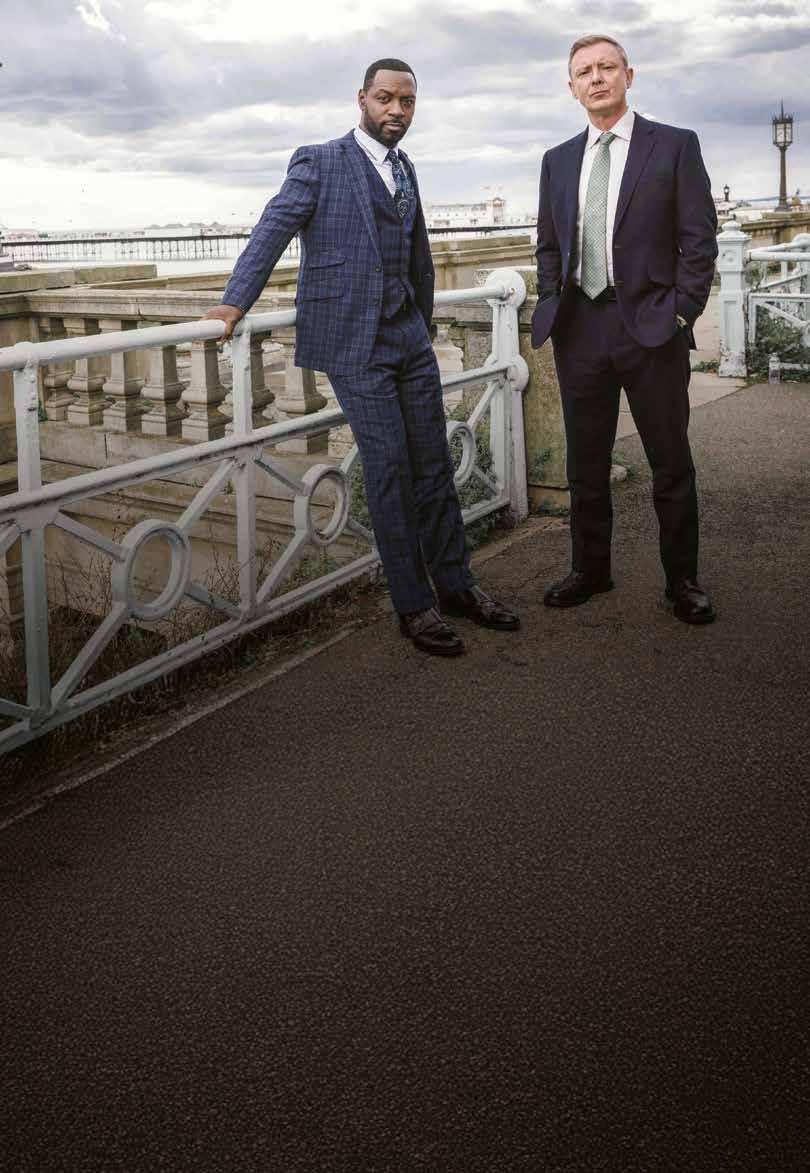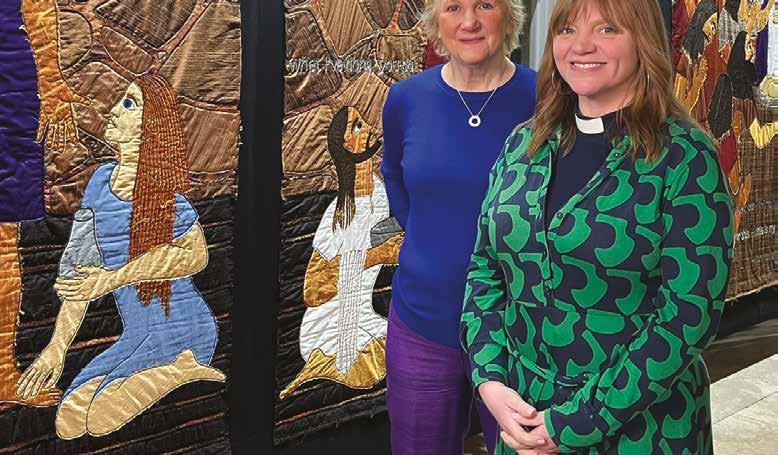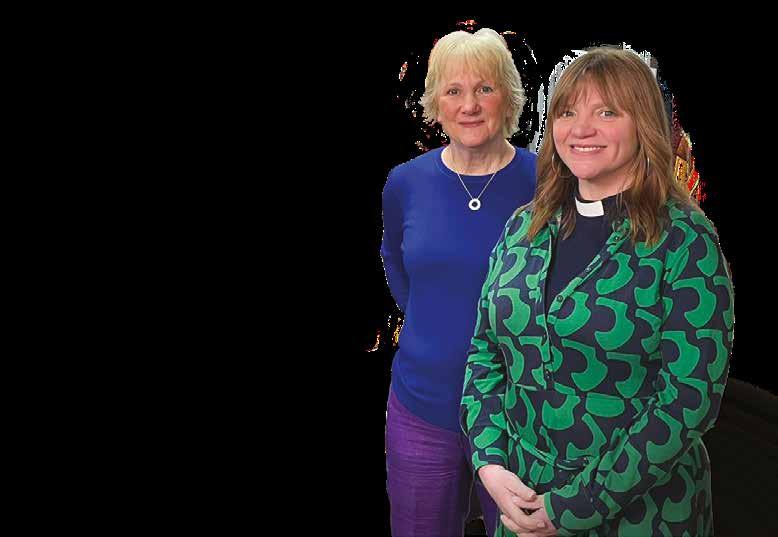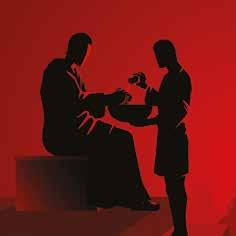Arresting drama

DSI Roy Grace has more cases to solve



DSI Roy Grace has more cases to solve

The Salvation Army is a Christian church and registered charity seeking to share the good news of Jesus and nurture committed followers of him. We also serve people without discrimination, care for creation and seek justice and reconciliation. We offer practical support and services in more than 700 centres throughout the UK. Go to salvationarmy.org.uk/find-a-church to find your nearest centre.
The Salvation Army first published a newspaper called the War Cry in London in December 1879, and we have continued to appear every week since then. Our name refers to our battle for people’s hearts and souls as we promote the positive impact of the Christian faith and The Salvation Army’s fight for greater social justice.
According to Captain James T Kirk of the starship Enterprise, space is the final frontier. The idea of what it would be like for humankind to travel to the far-flung corners of the universe has inspired not only Star Trek but a whole host of sci-fi books, films and TV series.
A dramatic crime wave has hit TV and streaming platforms. Whether it’s the cosy feel of clerics solving mysteries or the gritty storylines of inner-city murders investigated by detectives battling their own demons, viewers can’t seem to get enough of whodunnits. In this week’s new series of ITV1 police drama Unforgotten Sinéad Keenan have more cases to solve.
Editor: Andrew Stone, Major
Deputy Editor: Philip Halcrow
Staff
Staff
Emily Bright
Claire Brine
Staff Writer: Ewan Hall
Editorial Assistant: Linda McTurk
Graphic Designer: Mark Knight
Graphic Designer: Natalie Adkins
Email: warcry@salvationarmy.org.uk
The Salvation Army
United Kingdom and Ireland Territory 1 Champion Park London SE5 8FJ
Tel: 0845 634 0101
Subscriptions: 01933 445445 (option 1, option 1) or email: subscriptions@satcol.org
Founders: William and Catherine Booth
International leaders: General Lyndon Buckingham and Commissioner Bronwyn Buckingham
Territorial leaders: Commissioners Jenine and Paul Main
Editor-in-Chief: Major Julian Watchorn
Perhaps the popularity of these crime dramas is explained by the satisfaction that viewers gain from seeing wrongs put right and the guilty brought to justice. Often the shows’ wrong’uns are bad to the core and have deliberately chosen to follow a life of crime.
The reality is that Earthlings’ trips into space haven’t progressed much further than the moon. However, as we report in this week’s War Cry, the journeys that people have made are being recognised by the International Day of Human Space Flight. The day celebrates humankind’s voyages into space and aims to show how those travels have changed our world through scientific advances.
However, according to people who work with offenders, the reality is often far more complex. After becoming a prison chaplain, the Rev Tracy Sickel quickly realised that various factors played a part in women becoming inmates.
Even though it’s more than 50 years since astronauts first reached the moon, space exploration still has the ability to stir our interest and cause us to wonder what might be ‘out there’ in galaxies light years away.
‘I sat down with women in their induction interviews on their first day in prison,’ she tells us, ‘and it was the same things I was hearing continually: lack of self-esteem, abusive relationships, trauma, unforgiveness and addictions. Often they were victims themselves.’
The vastness of the universe can also prompt some to think about how it all came into existence and whether there is some meaning or being behind it all. Christians believe that everything in this world and beyond was created by God. They also believe that that same God came into our world as a human called Jesus.
While Tracy never dismissed the implications of the women’s crimes, some years ago she grew disheartened at seeing women returning to prison after their release. So she established a Christian charity, Imago Dei, to support them once they had completed their sentence.
As well as offering practical help, Tracy wants to show the women how a relationship with God can help them.
This week, we speak to Paul Birch, the artistic director of Riding Lights Theatre Company, which has produced a podcast series that dramatically portrays what happened to Jesus in the days leading up to his death and subsequent resurrection.
‘We work with people of all faiths and none in prisons,’ she says. ‘We build relationships, placing value on the women and helping them see themselves as the Lord sees them... We then allow the Lord to step in and do what only he can do – transform lives.’
‘The message of Easter is that Jesus offers incredible love and power to our broken world,’ Paul tells us. ‘There is hope and light and life – through the resurrection of Jesus.’
It’s inspiring to know that the Creator of the universe loved us so much that he came to Earth in order that we might have a fulfilling life and know his love for ourselves.
God’s offer to transform lives is for us all, no matter who we are or what we have done. If we allow him space in our heart, we’ll detect changes in our character that we couldn’t have possibly imagined.





Are any of the suspects who they say they are in crime drama?
TV Preview: Grace Sundays ITV1 and ITVX
By Ewan Hall
Awoman wearing green walks out of a hotel on Brighton’s sea front, leaving a man to face the wrath of another woman shouting at his door. The situation doesn’t look good for the man, and – once the coast is clear – the hotel staff go to his room to check on him. On entering, they find a body. Suddenly there are key questions needing to be answered in the next instalment of Grace
A week after the latest series of the crime drama almost began with a bang –as DSI Roy Grace (John Simm), his partner DS Glenn Branson (Richie Campbell) and their team of investigators dealt with a bomb threat at a football ground, as well as a washed-up body on a beach and a missing teenager – they now face a completely different set of challenges.
The body found in the hotel room is originally thought to be that of Travis Simmons. However, Grace and his

colleagues discover a hotel key card with a different name among the man’s belongings. Delving further into the mystery, they soon start to question whether the man in the hotel was who he said he was.
They uncover an online catfishing scheme, in which people are pretending to be someone they’re not in order to lure others into supposedly romantic relationships. Are any of the suspects in the case who they say they are?
Even away from police dramas, people have been known to pretend to be someone they’re not. There have been many cases where someone has arranged a date only to discover that the person looks very different from their online profile.
But it is not just online relationships that can mislead us. We can also find that work colleagues, friends or family members are
sometimes not all they seem to be. They may say all the right things to us in person, but then make snide remarks and gossip about us when our backs are turned –leaving us feeling betrayed and worried about who we can trust.
The good news is that there is someone who is exactly who he says he is – Jesus. If we choose to follow him, he can be a source of assurance in our life.
In a letter to early Christians, one author wrote: ‘Jesus Christ is the same yesterday and today and for ever’ (Hebrews 13:8 New International Version).
There will be times when people will hurt us by not being the person we thought they were. But if we follow Jesus, we will discover that, unlike any other friend, he will never let us down. He is constant, trustworthy and dependable even when we are unsure of those around us – always has been, always will be.
Sarah Olowofoyeku gives her take on a story that has caught the attention of War Cry reporters
A recent project has shown that growing, sharing and saving seeds can benefit more than just the environment.
Positive News – a magazine which provides readers with uplifting stories – told how Catherine Howell of ecological charity the Gaia Foundation invited 15 people who were experiencing challenges with their mental wellbeing to produce a crop of their choice and harvest the seed.
The group met fortnightly over the course of a year, completing a mental health check-in at the beginning of each session and scoring their mental wellbeing at the beginning and the end of the course.
A little bit of faith has power
Catherine found that, even though the participants faced challenges during the year, the average score rose by 6 per cent, and the biggest increases were in those people who had felt lowest at the start.
She asked the people who took part how much the positive change was due to growing seeds, as opposed to being in a group or outdoors. They told her: ‘It’s the seed that’s made the difference.’
While I can’t attest to the positive experience of successfully growing seeds – as I’m utterly hopeless at gardening – the principle does resonate with me.
I’ve read stories in the Bible where Jesus talks about seeds. He lived in a place where people worked on the land, so he often used natural imagery to express eternal truths.
One day he said to his followers: ‘If you have faith as small as a mustard seed, you can say to this mulberry tree, “Be uprooted and planted in the sea,” and it will obey you’ (Luke 17:6 New International Version).
I don’t think Jesus was being literal. But by saying that faith the size of a mustard seed, which is tiny, could move a tree, he was saying that the smallest bit of faith in him could have a huge impact.
As we live in a time when bad news seems to be everywhere we look, it is easy for hopelessness to take root. So it’s encouraging to know that just a little bit of faith has the power to uproot those negative feelings.
But it’s important to note that faith is not just wishful thinking. Instead, it is a firm hope in an all-powerful God. And, in a world where despair threatens to make us idle, it is the tiny seed that can make a big difference, propelling us to take action for good.
A first-time author told Premier Christianity magazine that, after 22 years of searching for fulfilment, he has found true peace in his faith in Jesus.
Calum Mackenzie, who has published a poetry collection called Grace Notes, explained that, although he grew up in a Christian family, he turned away from his faith while at university. He said he had spent years trying drugs and alcohol and travelling the world, but felt no satisfaction from any of it.
Calum’s life hit rock bottom, leading to suicidal thoughts and self-harm. In desperation he prayed and experienced God.
Calum summarised his experience by saying: ‘My Christian friends and family prayed for me – without seeing a single sign that God was doing anything in my life.
‘But God was working behind the scenes and honoured those prayers. Even if you’ve prayed for years … it doesn’t mean that nothing’s happening.’

On Palm Sunday (13 April), which marks the beginning of the week leading up to Easter, Songs of Praise follows the Rev Canon Kate Bottley as she visits Southwell Minster in Nottinghamshire and sees an exhibition of textiles by artist Jacqui Parkinson which portray biblical scenes.
As well as looking at the panels of Threads through the Bible, Kate hears how the women who feature in the Easter story are still inspiring modern women.
Later in the week, Kate is also the presenter of Good Friday Reflections on Radio 2. Featuring music and guests, the programme aims to provide listeners with the space to consider the impact of loss and grief in their lives, while also remembering the hope, love and faith to be found in the Easter story.
One of Kate’s guests is Christian rapper Guvna B, who speaks of the grief of losing his father and the hope he finds in his relationship with his children. Kate also talks with Tiggy Walker, the wife of Radio 2 presenter Johnnie Walker, who died last year. Tiggy explains why the song ‘Amazing Grace’ – played by Johnnie on his last Sounds of the 70s show – remains so significant to her.


Actor Denzel Washington (pictured) has spoken about his Christian faith to the University of Colorado’s American football team.
At a team meeting posted on YouTube, the two-time Oscar winner, who was ordained as a minister in December, told the players and coaching staff about the complex relationship that he has had with God over the years.
‘I rejected God,’ he recalled, ‘I hated God, I loved God, I appreciated God, I’ve had no patience with God, but God had nothing but patience with me. That’s why they call it grace.’

A Christian giving charity that allows people to make donations to individuals who have posted online about their specific needs experienced its most generous day
After being featured in an online Lent resource, Acts435 – which takes its name from a story in the Bible in which Christians shared their possessions and money – attracted more than 550 new donors in one day, giving a total of £29,960 to people in need. The charity had been highlighted in 40acts, a daily email that encourages Christians to carry out an act of generosity for that day. One of the 187 needs that were met during the 24-hour period was that of a man who lived on a houseboat and was unable to work because of health problems. The gifts of donors enabled him to replace his mattress and bedding, which had been ruined by a flood.

In 2025, The Salvation Army celebrates its 160th anniversary. During the year, we will be looking back at some of the history of the church and charity. This time, we turn the clock back to the 1930s to discover the support given to children caught up in the Spanish Civil War
Feature by Naomi Sharp
Between 1936 and 1939, a civil war raged in Spain between Republicans and Nationalists. It was a bitter conflict that divided the nation. As conditions in the country became increasingly turbulent and violent, the Republicans oversaw the evacuation of up to 35,000 children, starting with children from the Basque area.
On 21 May 1937, about 4,000 were evacuated to the UK on the steamship SS Habana. Each child had been given a hexagonal cardboard disc to pin on their clothes on which was printed an identification number and the words ‘Expedición a Inglaterra’.
The SS Habana was designed to carry around 800 passengers, but on its voyage to England 3,840 children,
80 teachers, 15 priests, 2 doctors and another 120 people were crammed into the vessel. Some of the children slept in the lifeboats as they struggled to find anywhere else.
The majority of the children also suffered with seasickness as the journey became extremely rough in the Bay of Biscay. However, the steamer eventually arrived in Southampton on 23 May.
Thousands of people were at the quayside to meet the children, who, despite their arduous journey, were excited to be in England, especially when they saw bunting hanging everywhere. They thought it had been put up to welcome them, but it was left over from celebrations of the coronation of King George VI almost two weeks earlier.
The children were completely unprepared for camping
Once they had left the dock, the children went to a camp that had been set up for them in Eastleigh, Hampshire, after volunteers had worked round the clock to make sure it was ready.
The children, though, were completely unprepared for camping. Most of them were used to living in small flats in their industrialised city. Thankfully, not many of the children had to camp for very long, as it was planned that they would quickly be placed in homes.
The Salvation Army was the first organisation to offer that accommodation. It provided places to 400 children. By the end of the summer, all the other children had left the camp in Eastleigh as homes were found for them all over Great Britain.
The 400 children entrusted into the care of The Salvation Army were sent to the organisation’s centre in Clapton, east London. Salvationists across the UK gave generously towards the estimated cost of £1,000 a week to look after the children. Senior officers were on the steps to welcome the new arrivals, and crowds gathered on the street.
The children were surprised by the officers’ uniforms, particularly the women’s. The War Cry reported that in the centre ‘big ones and little ones were put together both for room and for company. The delight in their beds was both touching and humorous.’
After a few days during which the children settled in, those in charge began to teach them hymns. Some of
the children enjoyed outings, including to the Lord Mayor’s Show. Local people were fascinated by them – so much so, that they had to be told that they could not adopt them.
However, after the first few weeks, it became clear that things were becoming difficult. The centre was a large, old mansion, surrounded by a high wall. It was severely overcrowded with insufficient playing space. Furthermore, the children were supposed to be in quarantine for 60 days as there had been two cases of typhoid fever.
Many of the boys in particular reacted badly to their confinement. Some of them scaled the walls and scoured the neighbourhood for adventures, until they were brought back by the police. It was decided to move 200 of the children from Clapton to an orphanage at Brixton, and 50 older boys were sent to The Salvation Army’s ‘land and industrial colony’ – now known as the farm and employment training centre – at Hadleigh in Essex. There they were given jobs to do alongside the existing residents. In June 1937 the War Cry reported that the Spanish boys at Hadleigh were enjoying opportunities for employing their energies.

By April 1938, most of the Basque children in the UK had returned to their homeland.
In August 1940, a letter was sent from Spain to Brigadier John Martin, an officer who looked after children at Clapton. The letter was from one of the older Spanish girls who had been cared for by The Salvation Army during her time in the UK. Now married, she wrote: ‘I wish to offer you my home. My husband and I now have a place of our own, and there will always be room for you.’
Their daily routine included lessons in English, physical training, work on the land and games. The report said that the boys were in ‘abounding health and high spirits’, and ‘apart from the shadow of anxiety over their loved ones at home, this contingent of refugees are finding every hour happy and useful’.
l Naomi Sharp is assistant archivist at The Salvation Army’s International Heritage Centre


Eight voices, telling eight stories, exploring the events of Holy Week and Easter. Through its serialised podcast The Passion, Riding Lights Theatre Company is inviting audiences to journey back in time to first-century Jerusalem, to reflect on the final days of Jesus’ ministry, the events which led to his death on a cross and the miracle of the Resurrection, all told from the points of view of the people surrounding him.
Though actors at Riding Lights are used to telling the story of the Passion on stage, this is the first time that the touring company has ventured into podcasting. Artistic director Paul Birch, who wrote the scripts for each 15-minute episode, believes that turning the story into an audio drama gives the company the potential to reach its widest audience yet.
‘No one has to buy a ticket or travel to a venue in order to hear these stories,’ he explains. ‘It’s exciting for us that people can listen to this podcast all over the world. I also feel that making a podcast is in keeping with the Riding Lights ethos, which has always been to find creative ways to take drama into all kinds of space beyond conventional theatre.’



explains why Riding Lights Theatre Company has made a podcast telling the Easter story
Since the start of Lent, Riding Lights has been releasing a new episode of The Passion every week – and the last instalment, which tells the story of the Resurrection, will be made available on Easter Day.
‘Some people have been downloading the podcast episodes every week,’ Paul says. ‘But you could also listen to one episode a day during Holy Week, hearing the story about Good Friday on Good Friday itself, for example. I do think that there is something special about people taking a bit of time to reflect after they have listened to each story.’
However the podcast is used, Paul hopes that listeners will be able to identify with the characters featured – their hopes and fears, their problems and pressures.
‘As I was writing the script for each character, I considered the time that they lived in, but I also looked for the modern resonances,’ he says. ‘Episode two tells the story of a money changer in the Temple, who sells “holy money” to people. He thinks he’s doing God’s work – but his faith has become distorted and yet he can’t see it.
‘I think that a modern comparison
would be someone who’s trying to sell “wellbeing” – this idea that “if you buy or do this, you’re guaranteed something in return which will make life easier”. Suddenly the money changer’s story isn’t just about looking at life back then; it’s about the world now.’
There are key characters to the story such as Judas
The Passion also features a couple of other characters based on figures who make only brief, anonymous appearances in the Gospels. Paul has created back stories for them and drawn connections between them. In Miriam’s episode, for example, listeners hear from a fruit seller who is reluctantly preparing her produce for the Roman governor’s entry into Jerusalem. When a fisherman borrows her donkey so that Jesus can make his own triumphal entry on the other side of the city, she wonders about the trouble that lies ahead.
Later stories in the podcast feature some of the more well-known Gospel
characters – those who played a crucial role in the life of Jesus, such as Judas, who betrayed him; Peter, who denied him; and Pontius Pilate, the Roman governor who sentenced him to death.
‘I tried to make each voice on the podcast distinct,’ Paul says. ‘I didn’t want to include Jesus as one of the characters who speaks, because each person on the podcast has a different view of him. So it was a deliberate choice to let listeners encounter Jesus through their views.
‘For me, there are key characters to the story such as Judas, Peter and Pilate, because it would be difficult to talk about Easter without them. But I also wrote scripts for Mary, Jesus’ mother, and John, his disciple, because I think these characters provide unique ways of looking at the story.
‘Placing Mary at the foot of the cross, for example, and seeing the Crucifixion through her eyes, hopefully allows people to reflect on Jesus’ suffering in a different way. Hers is an episode about pain and
Turn to page 10 f
Jesus makes his triumphal entry into Jerusalem while riding on a donkey. The people shout ‘Hosanna’, a word of praise, and place branches and cloaks on the road in front of him (Matthew 21:1–11 New International Version).



Jesus enters the Temple courts, overturning the tables of the money changers and driving out the people who are buying and selling. He accuses them of turning God’s house into a ‘den of robbers’ (Mark 11:15–17).

Jesus and his disciples share in the Last Supper as part of the Jewish festival of Passover. Jesus breaks bread, telling his disciples: ‘Take and eat; this is my body.’ He hands them a cup of wine to drink, saying: ‘This is my blood.’ Later, after praying in the Garden of Gethsemane, Jesus is arrested and taken to the high priest, Caiaphas, who accuses him of blasphemy (Matthew 26:17–28, 36–66). From page 9
the feeling that everything has failed.’
Another podcast character to appear at the foot of the cross is Hodaya, a poverty-stricken widow who first appears in episode three. Though unnamed in the Gospels, she is praised by Jesus in the Temple for giving everything she has to God.
‘Some of the characters appear in more than one episode of the podcast, because I wanted listeners to see how their stories connect,’ says Paul. ‘For me, it made sense for the characters to talk to one another as I didn’t want the narratives to feel dislocated.’
As well as taking listeners into the heart of Holy Week, each podcast episode begins with a narrator issuing the
invitation: ‘Come with me now.’ Listeners are invited to come with their sorrows, with their ‘fists clenched tight’, with their mistakes – anything they ‘care to bring’.
‘T he narrator is there to set the scene and encourage meditation,’ Paul explains. ‘In episode four, Judas is talking about frustration and anger, asking the question: “Why isn’t the world better?” So listeners are invited to reflect from that perspective. In Hodaya’s story, the focus is on anxiety and fear for the future.
‘In every episode, we as listeners are invited to identify with each character, because we may find that there is a little bit of us inside each of them.’
As part of his research before writing each podcast script, Paul referred to the Bible’s Gospel narratives in order to build up a picture of what happened at the first Easter. He also considered why certain individuals may have wanted Jesus out of the way.
‘In my writing, I had to try to understand the events from each character’s point of view,’ he says. ‘So, with characters like Judas, I didn’t want him to come across as a melodramatic villain. You want to understand why he did what he did. What was his reasoning?
Jesus returns to the Temple and is questioned by the Jewish authorities. As people are giving their offerings, a poor widow steps forward to make her offering of two copper coins. Jesus praises her for giving ‘everything – all she had to live on’ (Mark 11:27 to 12:44).


In the early hours of the morning, Peter denies knowing Jesus. Judas takes his own life. Jesus’ trial continues when he stands before Pontius Pilate, the Roman governor, who sends him to King Herod, only for Herod to return him to Pilate. Pilate sentences him to death. After a crown of thorns is placed on his head, Jesus walks to the site of his execution. Mary watches as her son is crucified and dies. Jesus’ body is placed in a tomb with a large stone covering the entrance (Matthew 26:69 to 27:61; and Luke 22:54 to 23:55).

Judas, one of Jesus’ disciples meets with the chief priests and agrees to betray Jesus for 30 pieces of silver (Matthew 26:14–16).


Early in the morning, a group of women go to the tomb, where they plan to anoint Jesus’ body. When they arrive, the stone has been rolled away. Jesus’ tomb is empty. Two figures ‘in clothes that gleamed like lightning’ tell them: ‘He is not here; he has risen!’ (Luke 24:1–6).
‘The challenge when writing about Judas is not to detract from the choices he made, because at the end of the day, he betrayed Jesus. But in the podcast, he comes across as a character who is feeling disconnected. The Messiah isn’t delivering the Kingdom of God in the way that Judas thinks he should.’
Another character that Paul found interesting to write about was Peter, a passionate follower of Jesus who later denied knowing him.
‘I think his episode is surprising,’ says Paul, ‘because most of it doesn’t take place in Holy Week. A large part of it focuses on the story in the Bible in which he walks on water. When he heads towards Jesus, he’s demonstrating huge
faith – more than the other disciples. But then that moment is contrasted when, in denying Jesus, he shows the least faith.
‘I found it moving to think that Peter didn’t really acknowledge the depth of his own faith – and yet Jesus went on to call him the rock upon which he would build the Church. This was a man who was full of flaws, but also someone who had an immense love for Jesus and belief in him.’
As Easter Day approaches, Paul’s overriding hope is that the stories told in The Passion will help people across the world to reflect on the good news that Jesus Christ is risen.
‘The message of Easter is that Jesus offers incredible love and power to our broken world,’ he says. ‘Ultimately, I think
the Crucifixion and the Resurrection say two things. One is that the absolute worst can happen. God isn’t always going to stop the bad things in life, much as we would like him to.
‘But at the same time, beyond that, there is hope and light and life – through the resurrection of Jesus. Easter Sunday is coming. And that’s a great hope for us to hold on to.’

Your prayers are requested for Ryan, who has returned to live with his father after a period of experiencing homelessness. The War Cry invites readers to send in requests for prayer, including the first names of individuals and details of their circumstances, for publication. Send your Prayerlink requests to warcry@ salvationarmy.org.uk or to War Cry, 1 Champion Park, London SE5 8FJ. Mark your correspondence ‘Confidential’.
Christian
There is no set formula to becoming a Christian, but many people have found saying this prayer to be a helpful first step to a relationship with God
The second book that appears under the title Chronicles picks up where the first left off. David’s son, King Solomon, has been tasked with building the Temple –the spiritual centre of Israel’s relationship with God.
Having asked God for wisdom and gathered the men and materials, Solomon commences work, siting the Temple on Mount Moriah (chapters 2 to 3). Once work is completed, Solomon orders the Ark of the Covenant – the symbol of God’s presence with his people – to be installed (chapter 5). As the Temple is dedicated, so Solomon dedicates himself to obeying God. He then commences a building programme throughout his kingdom (chapters 6 to 8).
Most of the remainder of the book is a series of brief histories of the 19 kings and 1 queen who reigned in Judah from Solomon’s death to the people’s exile in Babylon (chapters 10 to 36).
Eleven monarchs, according to the chronicler, are unfaithful to the covenant that their predecessor David had made with God. When they are, two consequences tend to follow: the nation slips into spiritual decline – typically worshipping idols – and God punishes such unfaithfulness with war.
Lord Jesus Christ,
I am truly sorry for the things I have done wrong in my life. Please forgive me. I now turn from everything that I know is wrong.
Thank you that you died on the cross for me so that I could be forgiven and set free.
Thank you that you offer me forgiveness and the gift of your Holy Spirit.
Please come into my life by your Holy Spirit to be with me for ever.
Thank you, Lord Jesus. Amen

For example, the book says that David’s grandson Rehoboam ‘abandoned the law of the Lord’ and ‘because they had been unfaithful to the Lord, Shishak King of Egypt attacked Jerusalem’ (12:1 and 2).
But monarchs, such as King Asa (14:2–5), who urge their people to be faithful to God prosper.

Under some reigns, sorcery and the worship of false gods extends to the desecration of the nation’s holiest site. King Joash repairs the Temple and King Hezekiah purifies it (chapters 24 and 29).
Josiah is the last king to purge the Temple and the nation of idolatry. He celebrates the Passover, the national remembrance of the escape from Egyptian slavery (chapters 34 to 35).
Three ‘evil’ kings and 22 years later, the Jewish people are in captivity in Babylon (chapter 36).

To receive basic reading about Christianity and information about The Salvation Army, complete this coupon and send it to


1 2 3 4 5 6
Who played the title role in the film Batman Begins?
Who is the author of the historical novel The Women, about a nurse serving in the Vietnam War?
Who is the host of the TV competition Chess Masters: The Endgame?
What is the world’s longest wall?
What type of creature is a curlew?
What does the Danish word ‘hej’ mean in English?

Feature by Ewan Hall
Ground Control to Major Tom, we are celebrating the International Day of Human Space Flight on 12 April. The day is a time to reflect on the achievements of humankind’s ventures into space which began in 1961 when Soviet cosmonaut Yuri Gagarin made an out-of-this-world journey.
Fifty years after that first manned orbit, the United Nations general assembly decided to celebrate humankind’s travels into space and show how those adventures have changed our world, helping to produce solar panels, water-purification systems and greater computer technology.
The day marks the achievements of people such Valentina Tereshkova, who in 1963, became the first woman to orbit Earth, and Neil Armstrong, the first man on the moon in July 1969. It also acknowledges that the whole human race is connected on the planet we call home. In 1977, the Voyager Golden Record was launched into space. The 12-inch disc carried a message from humanity, asking whoever in the universe discovered and played it for friendship and peace.
To Simonetta Di Pippo, the director of the UN Office for Outer Space Affairs, the Voyager Golden Record project’s purpose is still significant today. She explains that it ‘reminds us of who we are, where we came from, and that we should treat each other with care’.
However, the history of our planet shows us that people have not always been good at handling others with care, whether on a global scale or in their individual lives. We may sometimes face disrespect or discrimination because of who we are and where we come from.
When Christians face such hard times they know that they can turn to Jesus, God’s Son, to be reassured that they are cared for.
When Jesus lived on the Earth, he showed his followers how much God cared for them. ‘As the Father has loved me,’ he said, ‘so have I loved you. Now remain in my love’ (John 15:9 New International Version).
No matter what challenges we face, if we put our trust in him, Jesus will provide us with a sense of peace, allowing us to experience a love from God which is out of this world.

1. Sink back (7)
5. Squander (5)
7. Accumulation (7)
8. Guffaw (5)
10. Singing part (4)
11. Decrees (8)
13. Cleared up (6)
14. Rearrange (6)
17. Month (8)
19. Voucher (4)
21. Tag (5)
22. Gripped (7)
23. Sturdy (5) 24. Held up (7)
DOWN
2. Found (7)
3. Tug (4)
4. Fourscore (6)
5. Affluent (4-2-2)
6. Crouch (5)
7. Very pretty (9)
9. Paused (9)

12. Charmed (8) 15. Sad (7)

16. Intensely cold (6) 18. Biblical tower (5) 20. Not succeed (4)
HONEYC O M B

Each solution starts on the coloured cell and reads clockwise round the number

1. Plant covered with stinging hairs
2. Tax refund
3. Old car
4. Student working to gain experience
5. Child of your uncle
6. Difficult quiz question
QUICK CROSSWORD ACROSS: 1. Relapse. 5. Waste. 7. Backlog. 8. Laugh. 10. Alto. 11. Statutes. 13. Tidied. 14. Adjust. 17. February. 19. Chit. 21. Label. 22. Grasped. 23. Solid. 24. Delayed. DOWN: 2. Located. 3. Pull. 4. Eighty. 5. Well-to-do. 6. Squat. 7. Beautiful. 9. Hesitated. 12. Beguiled. 15. Unhappy. 16. Frigid. 18. Babel. 20. Fail. HONEYCOMB 1. Nettle. 2. Rebate. 3. Banger. 4. Intern. 5. Cousin. 6. Teaser.
Fill the grid so that every column, every row and every 3x3 box contains the digits 1 to 9
Look up, down, forwards, backwards and diagonally on the grid to find these words that include high-scoring Scrabble letters


METHOD
250g wholewheat dried egg noodles
1tbsp vegetable oil
350g frozen skinless chicken breast, defrosted and sliced
1 onion, sliced ½ red pepper, sliced
1 large carrot, cut into matchsticks
125g Savoy cabbage, shredded
125g broccoli florets, diced
½ tsp Chinese fivespice seasoning
2tbsp reduced-salt soy sauce

2
Cook the noodles according to the packet instructions.
1tbsp olive oil
1 small onion, finely chopped
1 garlic clove, crushed
150g risotto rice
750ml reducedsalt chicken stock
100g frozen peas
100g cooked chicken, torn into strips
1tbsp lemon juice
Mixed herbs
20g Parmesan, grated




Heat the oil in a wok or a deep large pan over a high heat. Add the chicken to the pan and cook for 3 minutes, stirring constantly.
Add the onion, red pepper, carrot, cabbage and broccoli and cook, stirring continuously, for a further 5-7 minutes, until the chicken is cooked through and the vegetables are softened but still crunchy.
Stir through the seasoning and soy sauce. Turn off the heat.
Add the noodles to the wok. Mix thoroughly, then serve immediately.

METHOD

Heat the oil in a thick-bottomed pan, then add the onion and cook over a medium heat until it is soft and translucent. Add the garlic and cook for a further minute. Stir in the rice, coating it with the oil.
Add the stock a ladleful at a time for approximately 20 minutes, stirring frequently, until the rice is almost cooked.
Add the peas and chicken, then cook for 5 minutes, until the risotto is piping hot throughout. The rice should be creamy, but firm to the bite.

